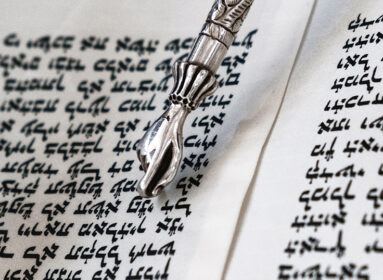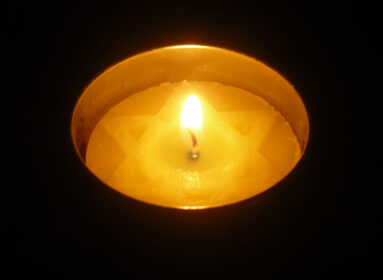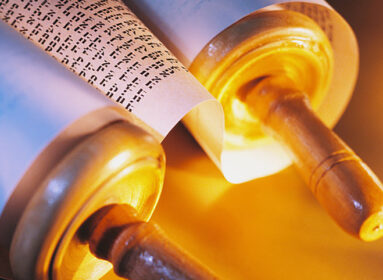
Rabbi Shmuel Reichman
The following collection of brief and profound insights into the Haggadah is designed to help make your Seder a meaningful and transformative experience.
Why do we announce all the steps of the Seder
Any great journey begins with a clear goal and destination. As we say every Friday evening in Lecha Dodi, “Sof ma’aseh bi’machshava techilah” – the physical result originates first within the mind. In order to accomplish anything great you must first create a clear target, and only then determine what steps you must take to get there.
The Seder is comprised of 15 steps, which is the same number of steps leading up to the Beit Ha’Mikdash – the Holy Temple – and the same number of “Shir Hamaalos” psalms – the songs of ascension. The Seder is likewise a 15-step process of ascension, a 15-step journey towards spiritual greatness. However, one does not simply achieve spiritual greatness accidentally, it requires focus, planning, and extreme dedication. The Seder night is a journey with tremendous potential, providing an opportunity to tap into something genuinely special. On the Seder night, we attempt to experience true freedom, a fundamentally deeper connection with Hashem, true gratitude, and an understanding of our mission in this world. Only when we lay out the steps of our Pesach Seder and create a clear destination can we achieve the extraordinary.
What’s with all the questions?
A notably prominent theme of the Seder is that of asking questions. While “Mah Nishtanah” is the most obvious example, the commentators explain many features of the Seder as purely serving as an impetus for the children to ask questions. It’s not only children, though, who are enjoined to question. The Gemara in Pesachim (116a) says that if a man’s child cannot ask the questions, then his wife should, and if he has no wife, he must ask himself questions. Even if two Torah scholars are sharing their Seder together, they should ask each other. Why is questioning such an integral part of the Pesach Seder?
Asking questions is the gateway to learning. A question allows you to recognize your current limitations; to shed the illusion that you already know everything. The Gemara in Gittin (43a) says that you can only understand a Torah concept if you originally struggled with it. Only by recognizing that you don’t already know something can you break it down, analyze it, and see it in a new way, thereby building a new, deeper understanding. If you believe that you fully understand something, you simply will not allow your mind to develop a new way of seeing it. Only by realizing a lack in your understanding and perception can you develop deeper paradigms.
The Seder night serves as an opportunity to pass on our tradition and legacy to the next generation. It’s a night when we speak about emunah (faith), the meaning of being a Jew, and our purpose in this world. In order to teach these lessons to our children and ourselves in a deep and lasting way, we must encourage the Seder participants to ask questions, no matter the age or knowledge level.
Our goal and mission as the Jewish People is to grow, develop ourselves, and fulfill our potential. On the Seder night, as we focus on whom each of us can become, we ask questions – creating holes that we then yearn to fill with additional knowledge, insight, and growth.
The Ke’ara: A pathway to the spiritual
The ke’ara (Seder plate) holds many symbolic foods that we use throughout the Seder. Some of these are eaten during the course of the Seder, while others we simply look or point at. What is the meaning of these symbols? The simple answer is that we display these foods in order to engage the children, to encourage their curiosity and questions. There is a deeper idea which can be learned here as well, one that is applicable to those of all ages. The most essential principle to internalize in this world is that there is always something deeper than that which appears on the surface. Living in a physical world can compel one to forget to seek out the spirituality inherent within every object, event, and person in this world. Seder night is when we instill within ourselves the pillars of emunah – of faith – and our mission as the Jewish people. On this night, we must all learn this powerful principle. Each physical object on the ka’arah represents a world of profundity, but this is not limited to the Seder plate alone.
Why tell the story of the exodus from Egypt…over and over?
We conclude the paragraph of “Avadim Hayinu” by proclaiming, “v’chol hamarbeh li’saper bi’yitzias Mitzrayim, harei zeh mishubach” – all those who elaborate on the Exodus from Egypt, behold, this is praiseworthy. The Rambam (Maimonides) codifies this as a legitimate halacha of Seder night. What is the importance of telling over the Pesach story at great length, and why on this night specifically?
There are two ways to interpret the statement of “v’chol hamarbeh.” The first is that one should tell over as much of the Exodus story as possible. The second is that one should delve into the miracles and wonders that Hashem performed when taking us out of Mitzrayim in as much depth as possible.
A third way to understand this statement is that the exodus was not merely a historical event, rather it was the birth of the Jewish people – our people, you and me. The story did not end with the birth of the Jewish people, it continues with them growing into the nation they are meant to become. When the Jewish people left Egypt, we journeyed to Mount Sinai, where we were given the Torah and our mission in this world as Hashem’s chosen nation. The Haggadah says that whoever increasingly tells the story of the exodus from Egypt is praiseworthy. Jewish history is our mission and destiny, and we must continue to grow and thrive in this mission. The goal is to make yourself a part of the Jewish story.
Rabbi Reichman will discuss “Deep Ideas for Your Pesach Seder, Read to Order,” on Zoom, Tuesday, March 23, 8 p.m. For more information: (718) 285-9132, events@chazaq.org, chazaq.org.
Passover & the Pandemic: Finding strength in the story of our people
Recently, we asked several Connecticut rabbis for their thoughts on Passover in the time of COVID. Here is what two rabbis from West Hartford had to say.
Rabbi Michael Pincus
Congregation Beth Israel
West Hartford
I think it is hard to comprehend that this pandemic has lasted more than a year. Passover 2020 occurred only weeks after the first Covid shutdown. Last year we were like our ancestors fleeing Egypt with no time to prepare. We were forced to learn quickly how to live in a new reality. Like our ancestors in our story, we would end up living in an unknown wilderness far longer than we had expected.
In some ways, it feels as if we are on the plains of Moab like our ancestors 40 years later. We can see the promised land and we can anticipate the end of our journey. Perhaps some of us can even smell hints of freedom, like the sweet fragrance of milk and honey lingering in the air.
But we all aren’t there yet.
And so many of us will spend one more holiday huddled around our Zoom screens or warily gathering with extended family uncertain if it is safe to lower one’s mask.
However we celebrate Passover this year, may we have greater appreciation for our people’s strength and courage and our ancestors’ vision.
May we be inspired by the promise of hope that this holiday of Passover is all about.
Rabbi Tuvia Brander
Young Israel of West Hartfordd
West Hartford
Here we are again – preparing for the season of redemption amidst a lingering global pandemic!
In so many ways, our experiences today mirror the lives of our ancestors who left Egypt over 3000 years ago. While the Exodus brought them freedom, our ancestors too were thrust into a world of uncertainty and challenges. They became a people, wanting for food and water, wandering the desert in search of the promised land, and a new nation struggling to recast its national identity after years of disrepair and slavery.
Yet, we celebrate each year on Pesach the joy and jubilation of the beginnings of their freedom, of new hope kindled and of renewed anticipation of a brighter and better future; on Pesach, we celebrate the beginning of the journey towards freedom.
So too, today!
We have been living through trying times (to say the least). On this Pesach, we celebrate, in these days and in our time, the beginning of the journey towards our freedom and renewal – the beginning of the light at the end of the tunnel.
Thanks to the grace of the Almighty and the miracle of modern medicine, we now have a vaccine (soon to be available to all). We have been blessed with people of remarkable courage, dedication and selflessness – first responders, medical professionals, educators, clergy, public servants and everyone else who have worked hard to keep our community going and safe! We can all be proud of all that we have done as individuals and a community to help us reach another Pesach and to provide strength and comfort to one another in during these difficult times.
This year, let us celebrate Pesach as our ancestors did – with the taste of renewed optimism for the future in our hearts and knowing that together better days are certainly ahead!








 Southern New England Jewish Ledger
Southern New England Jewish Ledger














